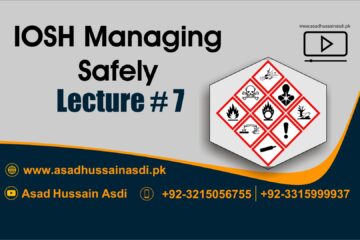ProQual Level 3 Award in Strategic Problem Solving in Community Safety and Crime Prevention Course in Islamabad || Registration Open
Registration Open= +92-3315999937, +92- 3215056755 (WhatsApp Only)Introduction
This qualification is aimed at practitioners and supervisors engaged in Community Safety and Crime Prevention activity. This will include Police Officers, Police Staff, relevant Local Authority Personnel and other agencies such as Education, Probation Services and Health workers. Topics include:
- Identifying key stakeholders
- Understanding the problem solving process
- Project management
- Protect implementation and monitoring
The Regulated Qualifications Framework (RQF) is the single framework for regulated qualifications, the regulatory body for this qualification is the Office of Qualifications and Examinations Regulation (Ofqual). This qualification has been accredited onto the RQF.
Entry Requirements
There are no formal entry requirements for this qualification. Centres should carry out an initial assessment of candidate skills and knowledge to identify any gaps and help plan the assessment.
Qualification Profile
Qualification title ProQual Level 3 Award in Strategic Problem Solving in
Community Safety and Crime Prevention
Ofqual qualification number 603/4123/3 Level 3
Total Qualification Time 40 hours (18 GLH)
Pass or fail
Assessment
Internally assessed and verified by centre staff External quality assurance by ProQual verifiers
Qualification start date 11/2/2019 Qualification end date
Qualification Structure
Candidates must complete the Mandatory unit.
| Unit Reference
Number |
Unit Title | Unit
Level |
GLH |
| A/617/4551 | Strategic problem solving | 3 | 18 |
Centre Requirements
Centres must be approved to offer this qualification. If your centre is not approved please complete and submit form ProQual Additional Qualification Approval Application.
Staff
Staff delivering this qualification must be appropriately qualified and occupationally competent.
Assessors/Internal Quality Assurance
For each competence-based unit centres must be able to provide at least one assessor and one internal quality assurance verifier who are suitably qualified for the specific occupational area. Assessors and internal quality assurance verifiers for competence-based units or qualifications will normally need to hold appropriate assessor or quality assurance verifier qualifications, such as:
- ProQual Level 3 Certificate in Teaching, Training and Assessing
- Award in Assessing Competence in the Work Environment
- Award in Assessing Vocationally Related Achievement
- Certificate in Assessing Vocational Achievement
- Award in the Internal Quality Assurance of Assessment Processes and Practices
- Certificate in Leading the Internal Quality Assurance of Assessment Processes and Practices
Support for Candidates
Materials produced by centres to support candidates should:
- enable them to track their achievements as they progress through the learning outcomes and assessment criteria;
- provide information on where ProQual’s policies and procedures can be viewed;
- provide a means of enabling Internal and External Quality Assurance staff to authenticate evidence
Assessment
Candidates must demonstrate the level of knowledge and competence described in the unit. Assessment is the process of measuring a candidate’s knowledge and understanding against the standards set in the qualification.
Each candidate is required to produce evidence which demonstrates their achievement of all of the learning outcomes and assessment criteria for each unit.
Evidence can include: – assignments/projects/reports
- worksheets
- portfolio of evidence
- record of oral and/or written questioning
- observation report by assessor
- recognition of prior learning
Learning outcomes set out what a candidate is expected to know, understand or be able to do.
Assessment criteria specify the standard a candidate must meet to show the learning outcome has been achieved.
Learning outcomes and assessment criteria for this qualification can be found from page 7 onwards.
Internal Quality Assurance
An internal quality assurance verifier confirms that assessment decisions made in centres are made by competent and qualified assessors, that they are the result of sound and fair assessment practice and that they are recorded accurately and appropriately.
Adjustments to Assessment
Adjustments to standard assessment arrangements are made on the individual needs of candidates. ProQual’s Reasonable Adjustments Policy and Special Consideration Policy sets out the steps to follow when implementing reasonable adjustments and special considerations and the service that ProQual provides for some of these arrangements.
Centres should contact ProQual for further information or queries about the contents of the policy.
Results Enquiries and Appeals
All enquiries relating to assessment or other decisions should be dealt with by centres, with
reference to ProQual’s Enquiries and Appeals Procedures.
Certification
Candidates who demonstrate achievement of the qualification will be awarded a certificate giving the full qualification title –
ProQual Level 3 Award in Strategic Problem Solving in Community Safety and Crime Prevention
Claiming certificates
Centres may claim certificates for candidates who have been registered with ProQual and who have successfully achieved the required number of credits for a qualification. All certificates will be issued to the centre for successful candidates.
Replacement certificates
If a replacement certificate is required a request must be made to ProQual in writing. Replacement certificates are labelled as such and are only provided when the claim has been authenticated. Refer to the Fee Schedule for details of charges for replacement certificates.
Learning Outcomes and Assessment Criteria
- Understand the appropriate use of the problem solving approach
- Understand the application of the SARA model within the concept of Problem Orientated Partnerships
- Understand the importance of defining the aim and setting SMART objectives in the problem solving process
- Understand the importance of using a partnership approach within the problem solving process
- Understand the importance of continuously assessing an ongoing problem solving initiative and conducting a final, comprehensive evaluation of a completed problem solving initiative
- Identify how crime occurs and the types of issues where a problem solving approach could be beneficial
- Demonstrate knowledge of health & safety, equality & diversity and ethics relevant to working in the problem solving role
- Explain the concept of Problem Orientated Partnerships (POPS)
- Explain the SARA model in relation to problem solving and POP
- Explain the Problem Analysis Triangle (PAT) and its variations
- Explain the Routine Activity Theory
- Explain the ten principles of Crime Prevention and identify where in the problem solving process they would be used
- Explain the difference between a perceived aim and a defined aim
- Demonstrate how to set ‘SMART’ objectives with appropriate targets
- Identify appropriate partners/stakeholders in the problem solving process and explain the benefit of engaging with those partners
- Explain the terms Enforcement Plan and Prevention Plan in relation to the response phase of the problem solving process
- Outline appropriate strategies that can be used in managing a problem solving partnership
- Recognise and explain the importance of accurate and timely record keeping during the problem solving process
- Identify and demonstrate a range of methods in which to assess progress during a problem solving initiative
- Explain and demonstrate the need for a comprehensive evaluation of any problem solving initiative
- Identify and explain the consequences of failing to conduct an effective evaluation of a problem solving initiative
Assessment
There must be valid, authentic and sufficient for all the assessment criteria. However, one piece of evidence may be used to meet the requirements of more than one learning outcome or assessment criterion.






















